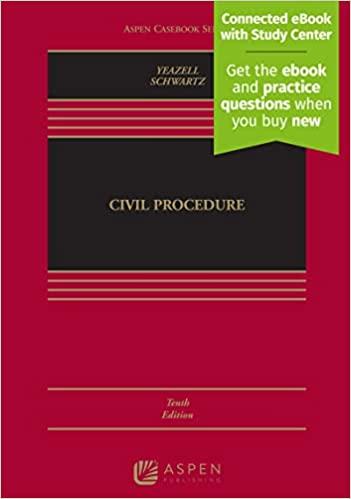Question
03 I NEED A GOOD AND DETAIL ANSWER TO EACH QUESTION PLEASE 22-1. Unfair Labor Practices. Consolidated Stores is undergoing a unionization campaign. Prior to
03 I NEED A GOOD AND DETAIL ANSWER TO EACH QUESTION PLEASE
22-1. Unfair Labor Practices.
Consolidated Stores is undergoing a unionization campaign. Prior to the union election, management states that the union is unnecessary to protect workers. Management also provides bonuses and wage increases to the workers during this period. The employees reject the union. Union organizers protest that the wage increases during the election campaign unfairly prejudiced the vote. Should these wage increases be regarded as an unfair labor practice? Discuss. (See Unfair Labor Practices.)
27-2. Antitrust Laws.
Allitron, Inc., and Donovan, Ltd., are interstate competitors selling similar appliances, principally in the states of Illinois, Indiana, Kentucky, and Ohio. Allitron and Donovan agree that Allitron will no longer sell in Indiana and Ohio and that Donovan will no longer sell in Illinois and Kentucky. Have Allitron and Donovan violated any antitrust laws? If so, which law? Explain. (See Section 1 of the Sherman Act.)
27-3. Price Fixing.
Together, EMI, Sony BMG Music Entertainment, Universal Music Group Recordings, Inc., and Warner Music Group Corporation produced, licensed, and distributed 80 percent of the digital music sold in the United States. The companies formed MusicNet to sell music to online services that sold the songs to consumers. MusicNet required all of the services to sell the songs at the same price and subject to the same restrictions. Digitization of music became cheaper, but MusicNet did not change its prices. Did MusicNet violate the antitrust laws? Explain. [Starr v. Sony BMG Music Entertainment, 592 F.3d 314 (2d Cir. 2010)] (See Section 1 of the Sherman Act.)
27-4. Business Case Problem with Sample Answer Price Discrimination.
Dayton Superior Corporation sells its products in interstate commerce to several companies, including Spa Steel Products, Inc. The purchasers often compete directly with each other for customers. For three years, one of Spa Steel's customers purchased Dayton Superior's products from two of Spa Steel's competitors. According to the customer, Spa Steel's prices were always 10 to 15 percent higher for the same products. As a result, Spa Steel lost sales to at least that customer and perhaps others. Spa Steel wants to sue Dayton Superior for price discrimination. Which requirements for such a claim under Section 2 of the Clayton Act does Spa Steel satisfy? What additional facts will it need to prove? [Dayton Superior Corp. v. Spa Steel Products, Inc., 2012 WL 113663 (N.D.N.Y. 2012)] (See The Clayton Act.)
REFERENCES: Cross, F., Miller, R. L. (2016). West's Legal Environment of Business (11a edition). Editor. Mason, OH: Cengage.
Step by Step Solution
There are 3 Steps involved in it
Step: 1

Get Instant Access to Expert-Tailored Solutions
See step-by-step solutions with expert insights and AI powered tools for academic success
Step: 2

Step: 3

Ace Your Homework with AI
Get the answers you need in no time with our AI-driven, step-by-step assistance
Get Started


